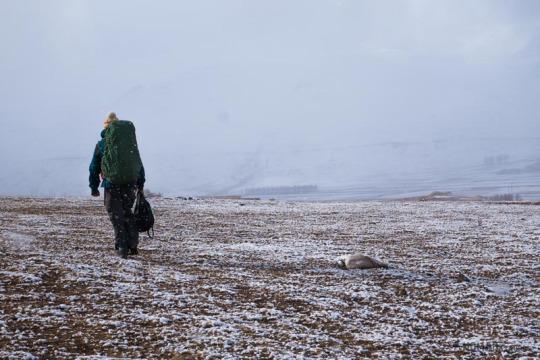
If I look back at the last six years in which my travel partner Alesha and I traveled around the world, I don’t ever regret making decision to leave everything behind and embark on this life of long term travel. Every waking moment we are on the road, we feel extremely lucky for the opportunities that have led us to create this lifestyle. Even though we have made some sacrifices to do this, and have worked very hard to save the money to travel long term (and continue to work on the road), the rewards have been more than worth the effort. Honestly, our lives are pretty awesome.
But there is a downside to everything, of course, and our lives are no exception. The longer we are on the road, the more we discover what I like to call the “curses of long term travel.” These are the negative effects of being modern-day nomads. Not every day is full of fun, adventure, spectacular sunsets, and cocktails on the beach. Here are the seven things we have struggled with life on the road.
1. It gets harder and harder to be impressed.
After years of exploring the world’s best temples, national parks, museums, and attractions, it gets harder and harder to be impressed. This is the curse we are most affected by today, and we constantly find ourselves becoming nonchalant when visiting places that others wait their whole lives to see. “It’s just another temple,” we’ll say, or, “Meh, we’ve been to moreauthentic villages.”
We need to remind ourselves to appreciate every wonder we encounter, no matter how small or how many times we think we’ve seen the same thing before. Not every attraction can be as mind-blowing as Angkor Wat. But that doesn’t mean that once you’ve been to the temples of Angkor, you never have to visit another historical site again.
2. You miss out on those special (and sad) moments back home.
Perhaps the hardest thing to deal with when you are constantly on the road is missing out on the special (and sad) moments back home. Weddings, birthdays and other celebrations pass you by, and a lot of the time, you are only reminded of them through photos posted on social media. Even more tragic is if a dear relative or friend passes while you are away, meaning you never got to say goodbye. And trust us, grieving on the road isn’t any easier than grieving with your family around you.
Luckily, through the wonders of the Internet, we can now stay connected with everyone back home via apps like Skype. We also take solace knowing that our friends and family are usually happy for us that we are out traveling the world. It helps us get through the sad moments, even when we are questioning why we choose to be away for so long.
3. Friendships are measured in days, not years.
Take a look at your friendship group. How long have your mates been in your life? Years? Decades? Did you grow up together? Those friendships may stay with you forever, but when you are always on the road, it is harder to form such close, lasting bonds with people.
Being transient means that we usually only get to spend a few days (or sometimes even only a few hours) with people who we genuinely like and get along with. I’ve lost count of the number of guys and girls I’ve formed incredible friendships with, only for us to part ways and never see or hear from each other again. We share amazing experiences together, and then vanish from each others’ lives. It’s a curse that never breaks unless we stop moving.
4. You’ve changed, but everything else is the same.
Returning home after an extended period of time always leaves me feeling like I’ve changed, but everything else is the same. My friends are still going to the same bars and eating at the same restaurants, my home town still looks exactly how I left it, even conversations go back to the same old topics we were discussing years ago. We end up questioning whether we really belong at home, or, perhaps even deeper, we sometimes rethink what “home” really means to us. I’m not saying I have changed for the better, but the truth is that I have definitely changed.
5. You experience traveler’s burnout.
If you travel to a lot of countries or over long distances continuously, it is easy to feel completely burnt out. After 10 months riding our motorbikes around Southeast Asia, checking into a different hotel every couple of days, packing and unpacking our backpacks, and spending every hour of daylight exploring new sights, Alicia and I were totally exhausted. We were getting frustrated way too easily, and becoming more and more jaded with life in general. We needed to stop for a few months and recharge the batteries, or risk quitting traveling altogether. The only cure for this is to slow down.
6. You’re always searching for the next adventure.
It’s harder to become impressed, true, but when we finally are, it just makes us want to seek out more adventures.Camping for free on the beaches of Hong Kong isn’t enough. It makes you want to camp on the Great Wall of China or in the mountains of Kyrgyzstan. Visiting 100 countries doesn’t quite cut it when you know there are 193 countries to explore. It is a hunger you can never satisfy, and every jaw-dropping experience just forces you to want to discover another. It’s like chasing the dragon you can never catch.
7. The idea of settling down scares the heck out of you.
“When are you going to stop traveling and settle down?” asks everyone, ever. It is the dreaded question that full-time travelers get asked all the time. If you’ve made it past your gap year and never stopped moving, then you know that nothing is more frightening than the idea of getting a full-time job, getting a mortgage, and rejoining the rat race. Some people call it running away, but who says that is how we are meant to live our life? Why does a life of unwanted responsibility have to be adhered to? When I feel completely happy making a minimal income and living a basic life, why should I have to change that?
To be clear, I am not saying that these curses are preventing me from continuing to live the life I want. They are not. I am saying, though, that they are important to know if you are considering a life of full-time travel yourself.












